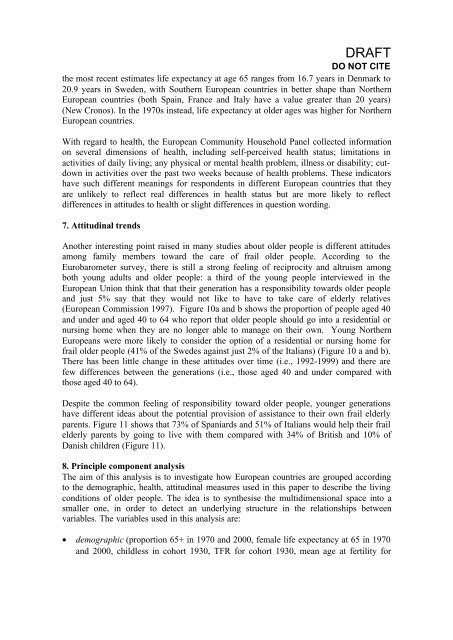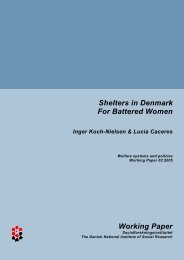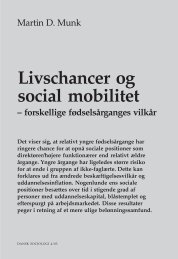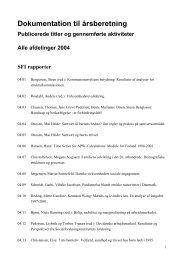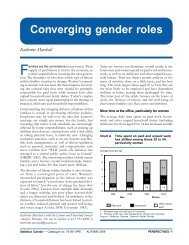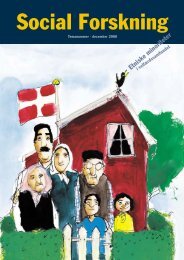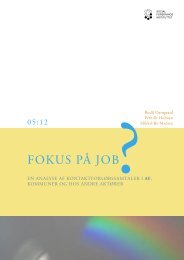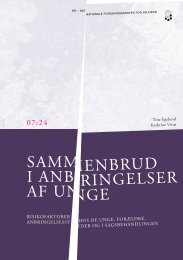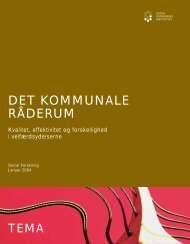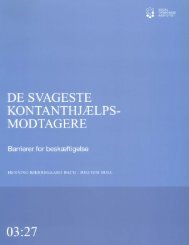Living Arrangements and Care Receipt Among Older People - SFI
Living Arrangements and Care Receipt Among Older People - SFI
Living Arrangements and Care Receipt Among Older People - SFI
You also want an ePaper? Increase the reach of your titles
YUMPU automatically turns print PDFs into web optimized ePapers that Google loves.
DRAFT<br />
DO NOT CITE<br />
the most recent estimates life expectancy at age 65 ranges from 16.7 years in Denmark to<br />
20.9 years in Sweden, with Southern European countries in better shape than Northern<br />
European countries (both Spain, France <strong>and</strong> Italy have a value greater than 20 years)<br />
(New Cronos). In the 1970s instead, life expectancy at older ages was higher for Northern<br />
European countries.<br />
With regard to health, the European Community Household Panel collected information<br />
on several dimensions of health, including self-perceived health status; limitations in<br />
activities of daily living; any physical or mental health problem, illness or disability; cutdown<br />
in activities over the past two weeks because of health problems. These indicators<br />
have such different meanings for respondents in different European countries that they<br />
are unlikely to reflect real differences in health status but are more likely to reflect<br />
differences in attitudes to health or slight differences in question wording.<br />
7. Attitudinal trends<br />
Another interesting point raised in many studies about older people is different attitudes<br />
among family members toward the care of frail older people. According to the<br />
Eurobarometer survey, there is still a strong feeling of reciprocity <strong>and</strong> altruism among<br />
both young adults <strong>and</strong> older people: a third of the young people interviewed in the<br />
European Union think that that their generation has a responsibility towards older people<br />
<strong>and</strong> just 5% say that they would not like to have to take care of elderly relatives<br />
(European Commission 1997). Figure 10a <strong>and</strong> b shows the proportion of people aged 40<br />
<strong>and</strong> under <strong>and</strong> aged 40 to 64 who report that older people should go into a residential or<br />
nursing home when they are no longer able to manage on their own. Young Northern<br />
Europeans were more likely to consider the option of a residential or nursing home for<br />
frail older people (41% of the Swedes against just 2% of the Italians) (Figure 10 a <strong>and</strong> b).<br />
There has been little change in these attitudes over time (i.e., 1992-1999) <strong>and</strong> there are<br />
few differences between the generations (i.e., those aged 40 <strong>and</strong> under compared with<br />
those aged 40 to 64).<br />
Despite the common feeling of responsibility toward older people, younger generations<br />
have different ideas about the potential provision of assistance to their own frail elderly<br />
parents. Figure 11 shows that 73% of Spaniards <strong>and</strong> 51% of Italians would help their frail<br />
elderly parents by going to live with them compared with 34% of British <strong>and</strong> 10% of<br />
Danish children (Figure 11).<br />
8. Principle component analysis<br />
The aim of this analysis is to investigate how European countries are grouped according<br />
to the demographic, health, attitudinal measures used in this paper to describe the living<br />
conditions of older people. The idea is to synthesise the multidimensional space into a<br />
smaller one, in order to detect an underlying structure in the relationships between<br />
variables. The variables used in this analysis are:<br />
• demographic (proportion 65+ in 1970 <strong>and</strong> 2000, female life expectancy at 65 in 1970<br />
<strong>and</strong> 2000, childless in cohort 1930, TFR for cohort 1930, mean age at fertility for


